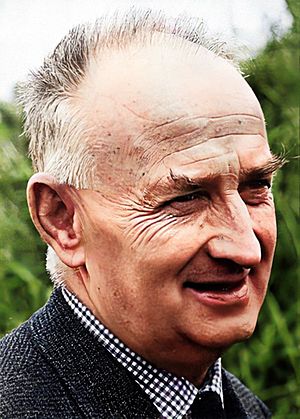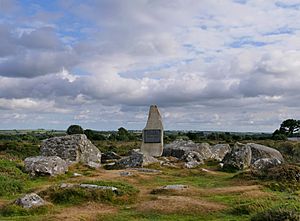Waldo Williams facts for kids
Quick facts for kids
Waldo Williams
|
|
|---|---|
 |
|
| Born | 30 September 1904 Haverfordwest, Pembrokeshire, Wales
|
| Died | 20 May 1971 (aged 66) Haverfordwest, Pembrokeshire, Wales
|
| Nationality | Welsh |
| Occupation | Poet, teacher and political campaigner |
| Known for | Poetry, pacifism |
Waldo Goronwy Williams (born September 30, 1904 – died May 20, 1971) was a very important Welsh-language poet in the 20th century. He was also a strong Christian pacifist, which means he believed in peace and was against war. He was also a Welsh nationalist, supporting Wales as a nation. People often just called him Waldo.
Contents
Waldo Williams's Life Story
Waldo Goronwy Williams was born in Haverfordwest, Pembrokeshire, Wales. He was the third child of John Edwal Williams, who was a school headmaster, and his wife Angharad. His father spoke both Welsh and English. However, his mother and Waldo himself only spoke English when he was very young.
Growing Up and Learning Welsh
In 1911, when Waldo was seven, his father became the head of a primary school in Mynachlog-ddu, Pembrokeshire. This is where Waldo learned to speak Welsh. In 1915, his family moved again to Llandissilio, Pembrokeshire, where his father led another primary school. Waldo was raised in the Baptist faith and became a member of Blaenconin Baptist Chapel when he was 16.
Education and Teaching Career
After attending grammar school in Narberth, Waldo went to the University College of Wales, Aberystwyth. He studied English and graduated in 1926. After that, he trained to be a teacher. He worked in many schools across Wales and England, including Kimbolton School. He also taught evening classes for adults.
Friendship and Early Influences
In the 1920s and 1930s, Waldo was good friends with Willie Jenkins. Willie was a pioneer of the Labour Party in Pembrokeshire. He was also a pacifist and had been imprisoned during the First World War because he refused to fight. Waldo's famous poem "Cofio" (Remembering) was written in 1931 during a visit to Willie Jenkins's farm.
Marriage and Loss
Waldo married Linda Llewellyn in 1941. Sadly, she passed away in 1943, which caused him great sadness. He never married again. He later called their two years together "fy mlynyddoedd mawr," which means "my great years."
Standing Up for Peace
Waldo was a pacifist, meaning he believed in peace and was against war. During the Korean War (1950–1953), he refused to pay his income tax. He did this as a protest against the war and against young men being forced to join the military. He continued this protest until forced military service ended in 1963. Because he refused to pay, his belongings were sometimes taken by officials. He was even put in prison twice in the early 1960s for not paying his taxes.
In the 1950s, he joined the Quakers in Milford Haven. Quakers are a religious group known for their commitment to peace.
Published Poetry and Politics
Waldo's book of poems, Dail Pren (Leaves of the Tree), was published in 1956. Many people consider it one of the most important Welsh poetry books published since 1945.
In the 1950s, Waldo became a supporter of Plaid Cymru, a Welsh political party. He even ran as a candidate for them in the Pembrokeshire area during the 1959 General Election.
Teaching Later in Life
In the late 1960s, Waldo taught Welsh to children aged 10–11 at Holy Name Catholic School in Fishguard, Pembrokeshire. People said he was an amazing teacher. He was very passionate and used wooden shapes of farm animals with their Welsh names on them to help children learn.
Death and Lasting Impact
Waldo Williams passed away in 1971 in Haverfordwest. He was buried at Blaenconin Chapel burial ground in Llandissilio. There is a special memorial for him at Rhos-fach, close to where he grew up in Mynachlog-ddu.
In 2019, a school in Haverfordwest was named Waldo Williams Primary School in his honor. Also, a room at Friends House in London, UK, is named after him.
Waldo Williams's Poetry
Waldo Williams's poems show many different influences. These include famous poets like William Wordsworth and Walt Whitman, as well as Welsh hymns. He also used the special rhyming patterns of traditional Welsh poetry, called cynghanedd.
Waldo was part of a Welsh tradition of poets called bardd gwlad, or folk poets. These poets wrote about the lives of people and places in their local area. But Waldo was also inspired by a special feeling he had when he was young. This feeling was about how all people are connected and should live together in peace. He saw this peaceful way of living in the farming communities in the Preseli Hills. This idea of belonging and living in harmony was a constant theme in his poetry.
This special feeling inspired some of his best poems, like "Mewn dau gae" (In two fields, 1956). Other well-known poems include "Cofio" (Remembering, 1931), "Y tangnefeddwyr" (The peacemakers, 1941), "Preseli" (1946), and "Pa beth yw dyn?" (What is it to be human? 1952).
Key Moments in Waldo Williams's Life
- 1911 – Moves to Mynachlog-ddu, Pembrokeshire. His father becomes the head of the local primary school.
- 1915 – Moves to Llandissilio, Pembrokeshire. His father is appointed head of another primary school.
- 1917 – Starts attending grammar school in Narberth.
- 1923 – Begins his studies at University College of Wales, Aberystwyth.
- 1926 – Graduates in English and starts training to be a teacher.
- 1928 – Begins teaching at various primary schools in Pembrokeshire.
- 1931 – Writes "Cofio" (Remembering). This poem was inspired by a visit to his friend Willie Jenkins's farm.
- 1936 – Publishes Cerddi'r plant (Poems for Children) with E Llwyd Williams.
- 1941 – Marries Linda Llewellyn in Blaenconin chapel in April.
- 1941 – Writes "Y tangnefeddwyr" (The peacemakers). This poem shows his love for his parents and for people who work for peace. It also expresses his horror at the bombing of Swansea.
- 1942 – Declares himself a conscientious objector to military service because he is a pacifist. He is given conditional exemption.
- 1942 – Moves from Pembrokeshire with his wife to the Llŷn Peninsula in north-west Wales. He teaches at Botwnnog County School.
- 1943 – Linda Llewellyn dies on June 1, 1943. Waldo is very sad.
- 1945 – Leaves Wales for England. He works in schools in Kimbolton and Lyneham, Wiltshire, until 1948.
- 1949 – Returns to Wales as a supply teacher in Builth Wells.
- 1950 – Returns to Pembrokeshire, where he lives for the rest of his life. He teaches in schools and adult classes.
- 1950 – During the Korean War, Waldo stops teaching to protest the war by not paying his income tax. He continues this protest until forced military service ends in 1963. His belongings were taken, and he was even imprisoned.
- 1953 – Joins the Religious Society of Friends (Quakers).
- 1956 – His important book of poems, Dail Pren (The Leaves of the Tree), is published.
- 1959 – Runs as a Plaid Cymru candidate in the Pembrokeshire area during the general election.
- 1960 – Is imprisoned for six weeks in Swansea Prison for not paying his income tax.
- 1961 – Is imprisoned again for not paying income tax, this time in Ashwell Prison, Rutland.
- 1963 – Starts teaching again at various primary schools in Pembrokeshire.
- 1971 – Suffers a stroke and passes away in St Thomas's Hospital, Haverfordwest.
Waldo Williams's Published Works
- Dail Pren (The Leaves of the Tree, 1956) – This was the only book of poems for adults that Waldo published during his lifetime. A new edition came out in 1991.
- Cerddi Waldo Williams (The Poems of Waldo Williams) (1992) – A collection of his poems.
- Waldo Williams: rhyddiaith (Waldo Williams: Prose) (2001) – A collection of his writings in both Welsh and English.
- Cerddi'r plant (Poems for children, 1936) – A book of poems that included work by Waldo Williams and E. Llwyd Williams.
- The Old Farmhouse (1961) – Waldo Williams translated this book into English. The original Welsh book was Yr hen dy ffarm by D. J. Williams.
- Waldo Williams: Cerddi 1922–1970 (Poems 1922–1970) (2012) – A very complete collection of Waldo's poetry.
Translations of His Work
Many of Waldo Williams's poems have been translated into English by Tony Conran. His work has also been translated by Rowan Williams, who used to be the Archbishop of Canterbury, and by Joseph P. Clancy.
See also
- List of peace activists
 | Selma Burke |
 | Pauline Powell Burns |
 | Frederick J. Brown |
 | Robert Blackburn |


